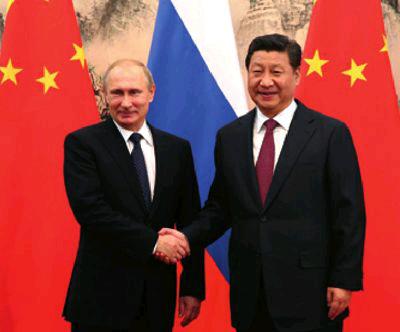New Impetus
2014-12-19ByShiZe
By+Shi+Ze
During their meeting on November 9, Chinese President Xi Jinping said to vladimir Putin that close contact between leaders of the two neighbors have led to an “evergreen” bilateral friendship and cooperation.
Xi also said that the duo have maintained close communication this year, achieving fruitful results in their design and strategic guidance for Sino-Russian ties as well as in the cultivation of a lasting cooperative and friendly relationship between the two sides.
Xi has met Putin 10 times since he assumed presidency in March 2013.
Putin, who was in Beijing to attend the annual Asia-Pacific Economic Leaders Meeting on November 10-11, especially hailed the comprehensive strategic partnership of coordination between the two countries, describing it as Moscows top foreign policy priority.
Common challenges
On December 27, 1991, just two days after the Soviet Union was dismantled, China recognized the Russian Federation and entered into diplomatic relations with it at the ambassadorial level. The relations between China and Russia have since maintained strong developmental momentum. They have continuously deepened their cooperation in many fields.
China and Russia have established four principles to develop their bilateral relations—no confrontation, no alignment, no interference in each others internal affairs and mutual respect. For more than two decades, these prin
ciples have proved correct by practice and facts. The signing of the Treaty of GoodNeighborliness and Friendly Cooperation on July l6, 2001 was a historic landmark in SinoRussian relations.
Despite a complicated international situation, China and Russia have kept sound and firm ties, which is a rare feat in relations between big countries. With their relationship evolving from“partnership” to “strategic partnership of coordination” and finally to “comprehensive strategic partnership of coordination,” the bilateral political mutual trust, practical cooperation, peopleto-people exchanges and strategic coordination have reached an unprecedented level.
The lasting friendship between China and Russia can also be attributed to their broad range of common interests. The two countries share a 4,300-km-long border. Border security is an important concern for both sides. Only with a stable and peaceful border can China and Russia focus on construction and economic development at home. Leaders of the two countries are fully aware of the great impor-tance of bilateral ties. They honestly seek to maintain a long-term good-neighborliness and friendliness. Such clear and resolute political will has laid a solid foundation for continuously improving Sino-Russian relationship.
Geopolitical conditions and strategic security concerns have impelled China and Russia to strengthen cooperation. For example, the two counties are faced with common challenges and threats from international terrorism, national separatism and religious extremism. They strongly support one another on issues concerning their respective core interests including national sovereignty, security and development.
After the Cold War ended, the world political structure has undergone drastic changes. Under such circumstances, China and Russia agreed to build a strategic partnership of coordination in 1996. This strategic collaboration, however, has not been aimed at any outside country.
Through concerted efforts spanning many years, China and Russia have completely resolved their border disputes through peaceful negotiations, marking a great diplomatic achievement for both sides. In 2008, the border demarcation work was completed.
Today, no major obstacles stand in the way of bilateral relations. In 2010, China and Russia vowed to comprehensively deepen their strategic partnership of coordination.
In a sense, cooperation between China and Russia can help them protect their core interests and maintain the balance of global power. But their efforts have focused more on shortterm cooperation and coordinated emergency responses than strategic and long-term cooperation projects. As a result, bilateral practical cooperation has not become a priority, which, in turn, has hindered the elevation of Sino-Russian economic and trade ties.
Economic ties
There are several reasons for the still low level of economic and trade ties between China and Russia.
In the early 1990s, political turbulence and economic depression in Russia restricted its cooperation with China. For a long time, bilateral trade was much smaller than that between China and other economies in the world. During the same period, Chinas annual trade with the United States has topped $500 billion, and its trade with the EU is even higher. Even annual import and export volume between China and South Korea has reached $210 billion.
Economic cooperation should have been an important drive for deepening bilateral ties, but in fact, China and Russia have not become major trading partners of each other. Against the backdrop of the global economic recession following the 2008 financial crisis, improving economic and trade ties between China and Russia is urgent.
Currently, a major problem is the unbalanced trade structure between China and Russia. China is the worlds factory of light industrial goods and machinery products. Meanwhile, Russias economy relies heavily on exporting natural resources and energy. Exports of natural resources and energy account for 65 to 70 percent of Russias government revenues and 85 to 90 percent of its foreign exchange earnings.
As China and Russia are seeking new impetus for the development of their bilateral relationship, they should put more emphasis on economic and trade cooperation given their post-crisis development challenges.
In the aftermath of the 2008 financial crisis, a recession hit developed economies and had a serious impact on emerging economies including China and Russia. Previously, economic growth of the two countries was driven by foreign investment and exports—a heavy reliance on overseas markets. Because of the recession, developed economies cut a large number of orders for Chinese manufacturers. Chinas exports dropped rapidly, while foreign investment in Russia also decreased sharply.
Furthermore, the recession impacted energy markets. In particular, the United States has reduced its dependence on oil imports since it made a breakthrough in exploiting shale oil and gas. The EU is also shifting its energy source away from Russia to other regions. Recently, falling crude oil prices on the international market has impacted the Russian economy. Under such circumstances, the huge Chinese market becomes an important alternative for Russias abundant energy resources.
Chinas role in bilateral economic and trade cooperation is changing. In the past, commodities exports accounted for a major portion of Chinas trade with Russia, and the latter had to turn to developed countries to meet its foreign investment needs. But with Chinas rapid development over the past few years, it is now in a position to become not only a major trading partner but also a major investor of Russia.
At present, the United States, the EU and Japan have imposed economic sanctions on Russia over its role in the Ukraine crisis. Their businesses are barred from investing in Russia, forcing Russia to seek greater economic cooperation with China. In 2012, Russia entered into the World Trade Organization. The opening Russian market will provide Chinese enterprises with growing investment opportunities.
China and Russia are attaching importance to transforming their economic growth modes. The two countries each have their own advantages. Russia is a world leader in aerospace and defense technology and heavy equipment manufacturing; China excels in agriculture, light industry and information technology. The two countries can complement each other and unleash huge potential for economic cooperation.
In recent years, bilateral trade and investment has been on the rise, and major projects such as the east route of the Sino-Russian natural gas pipeline have also made progress.
Although China and Russia have built their strategic partnership due to national security and geopolitical challenges, the partnership cannot be sustained for long without a solid foundation of economic cooperation. Now their bilateral ties have been pushed to new heights as practical cooperative efforts have been introduced.
Xi and Putin have repeatedly reiterated to expand economic cooperation between the two countries, which is expected to consolidate their strategic partnership. China needs to cooperate with Russia to attain the sustainable development it seeks. Meanwhile, Russia also needs support from China to tackle the challenges of economic sanctions imposed by the West.
Furthermore, in the future, China-Russia relations will be enriched with more practical cooperation in a broad scope, including energy, science and technology, culture and people-topeople exchanges, which will push bilateral ties to a higher level and benefit the two peoples as well as the prosperity of the world.
